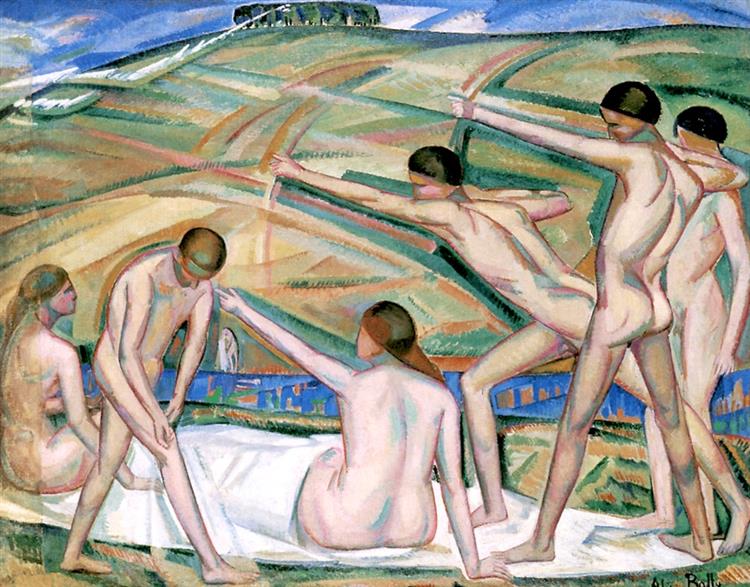Description
Alice Bailly, one of the most representative figures of the Swiss art of the twentieth century, presents us in "archers" - 1911 a work that encapsulates its innovative and avant -garde approach in painting. This piece, like others of its repertoire, reflects its link with the cubist and Fauvist movement, although it maintains a unique identity that distinguishes it from its contemporaries.
When contemplating "archers", one is immediately attracted to the dynamic nature of its forms and colors. The composition is a whirlwind of fragmented lines and figures that seem to be in constant movement. In the center of the work, characters can be distinguished, presumably the archers to which the title refers, although its representation is abstract and decomposed. Bailly uses a set of angular lines and curves suggesting arches and arrows, as well as human figures in different tension and action positions. This decomposition of the elements in geometric shapes is a clear influence of Cubism, a style that Bailly adopted and reinterpreted personally.
The use of color is vibrant and almost aggressive, a characteristic that Bailly borrows from Fauvism. The Palette of bright and contrasting intense reds, deep green, bright yellow and electric blue not only adds energy to the scene but also contributes to spatial disorientation. The colors seem to collide and merge at the same time, creating a sense of depth and movement. It is evident that Bailly does not use colors only to represent reality, but to evoke emotions and dynamism.
One of the most intriguing particularities of this work is the way he plays with the spectator's perception. The absence of a clear focal point and the fragmentation of the figures require that the audience take their time to discover the details and assemble the scene in their mind. This not only involves the viewer actively but also converts observation into a participatory experience.
As for the historical context, "archers" was painted at a time when European avant -garde were in full boiling. Bailly, although Switzerland, nurtured the artistic environment of Paris, where he came into contact with artists such as Picasso, Braque and Fauvistas. However, unlike some of his colleagues, Bailly maintained a more tangible connection with recognizable figures and landscapes, even when he decomposed them in abstract forms. This places it in an interesting intermediate position between complete abstraction and figurative representation.
This work also reflects the time of technical innovation that characterized Bailly's work. In addition to traditional painting, the artist explored mixed techniques, although "archers" is part of her most purely pictorial works. His ability to combine different techniques and styles confirms his versatility and his ability to adapt, features that make it stand out in the panorama of the art of his time.
The visual and emotional impact of "archers" lies in its ability to capture the dynamism and tension of archers in action, all through a technique that fragments and at the same time unifies the scene in a way that only someone with talent And Alice Bailly's vision could achieve. This work is not only a testimony of its technical skill, but also of its deep understanding of human emotions and their ability to transmit them through art.
KUADROS ©, a famous paint on your wall.
Hand-made oil painting reproductions, with the quality of professional artists and the distinctive seal of KUADROS ©.
Art reproduction service with satisfaction guarantee. If you are not completely satisfied with the replica of your painting, we refund your money 100%.

